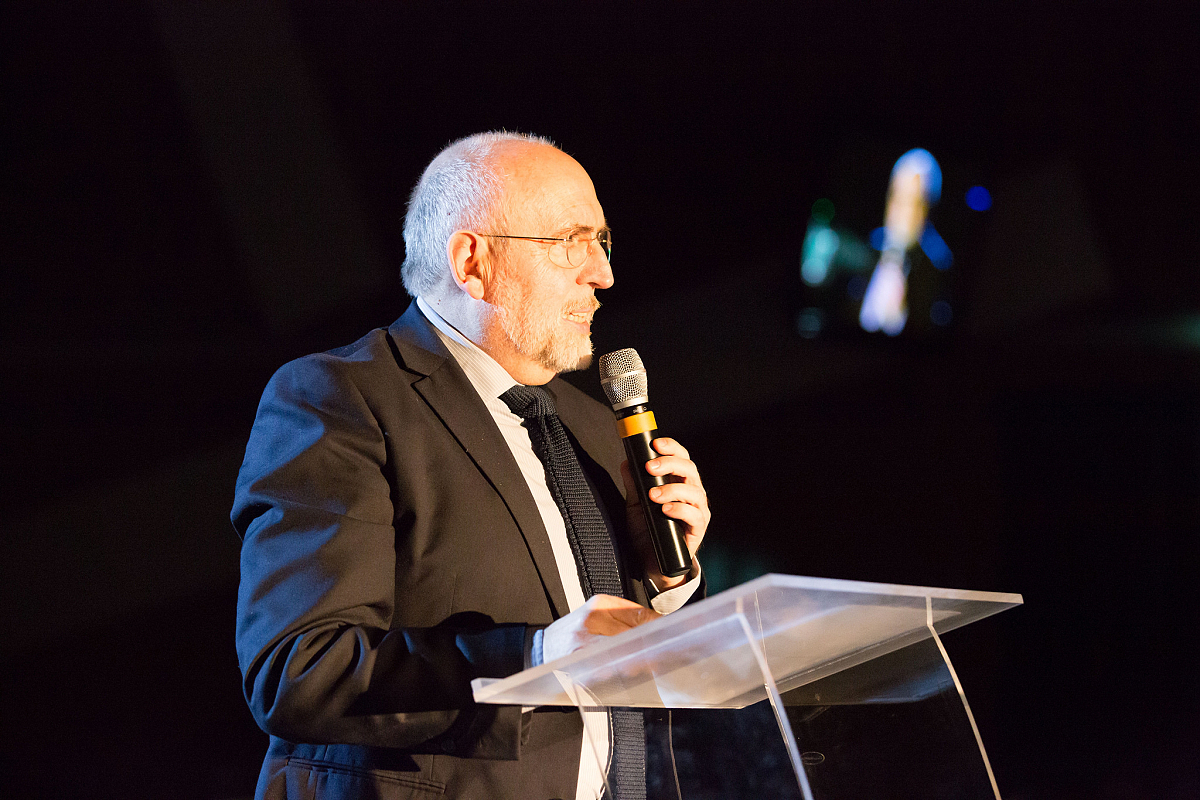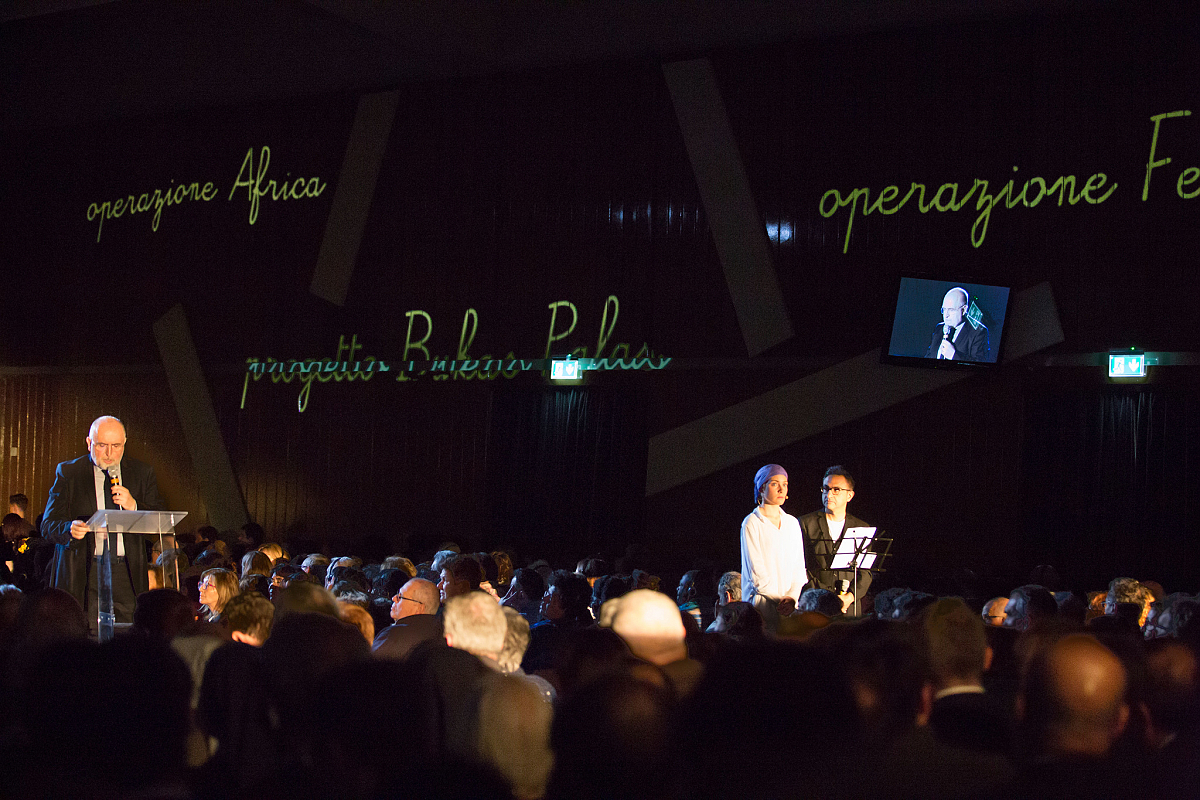 “… On your day, my God, I will come toward you… I will come toward you, my God (…) with my wildest dream: to bring you the world in my arms.” 1. The address given by Jesús Morán, co-president of the Focolare Movement, starts with this citation of the theologian Jacques Leclercq on the occasion of the event ‘The Great Attraction of Our Times’. We are once more astonished by the prophetic vision for society of this extraordinary woman whose ideal of “May they all be one” (Jn 17:21), started out from her own city of Trent and reached the whole world. Morán starts with a story of the protagonist of a fable, who lives with other personages thought of but then discarded by the authors of the stories, destined to live on another planet. He reflects on the role of the prophets: they are as big as they are small or they make themselves so in the eyes of human beings. Discarded by them, mocked, often killed, they are chosen by God to do that which nobody else can do. The prophets are in fact, the little people of God: this is where their greatness lies, even if sometimes they seem to be living “on another planet”. As we know, the word ‘prophet’ comes from the Greek and indicates not so much those who foresee the future but the mouthpiece, the messenger of God. In the Bible we also find prophetesses2. The prophets of Israel spoke to the people in the name of God; and everything could become an object of their words, because the word of God knows no limits. [….] In the midst of the historical context of her time – which evoke, in fact, not only the story of the prophets, but also biblical wisdom and the wisdom of ultimate goals – there manifests in her, a specific charism, that of unity, which led her to aim clearly and decisively towards universal brotherhood.”
“… On your day, my God, I will come toward you… I will come toward you, my God (…) with my wildest dream: to bring you the world in my arms.” 1. The address given by Jesús Morán, co-president of the Focolare Movement, starts with this citation of the theologian Jacques Leclercq on the occasion of the event ‘The Great Attraction of Our Times’. We are once more astonished by the prophetic vision for society of this extraordinary woman whose ideal of “May they all be one” (Jn 17:21), started out from her own city of Trent and reached the whole world. Morán starts with a story of the protagonist of a fable, who lives with other personages thought of but then discarded by the authors of the stories, destined to live on another planet. He reflects on the role of the prophets: they are as big as they are small or they make themselves so in the eyes of human beings. Discarded by them, mocked, often killed, they are chosen by God to do that which nobody else can do. The prophets are in fact, the little people of God: this is where their greatness lies, even if sometimes they seem to be living “on another planet”. As we know, the word ‘prophet’ comes from the Greek and indicates not so much those who foresee the future but the mouthpiece, the messenger of God. In the Bible we also find prophetesses2. The prophets of Israel spoke to the people in the name of God; and everything could become an object of their words, because the word of God knows no limits. [….] In the midst of the historical context of her time – which evoke, in fact, not only the story of the prophets, but also biblical wisdom and the wisdom of ultimate goals – there manifests in her, a specific charism, that of unity, which led her to aim clearly and decisively towards universal brotherhood.”  Morán underlines that in some of her notes of December 1946, “one can see the key pillars in Chiara Lubich’s prophetic vision for society. She, in fact, was not a social reformer, just as Jesus wasn’t. Chiara’s dream, in effect, aims much higher and more profoundly, and that is to the anthropological and theological foundation underlying every kind of social reform: universal family and unity as envisaged by the man-God, Jesus.” “This is why we could say,” Morán explains, “that the first social project that Chiara founded was in fact the first community of the Focolare that began in Trent immediately after the war. This community took the Acts of the Apostles literally (Acts 2, 42-48); they practised a radical communion of goods and did all they could to care for the poor and the thousands of suffering people the war had left in its wake. This underlying experience has never been lost. Indeed it is the inspiration behind all the activities and social projects that have been undertaken over the years by Chiara herself and all those who, in following her, have made their own the Ideal of unity. In all of this Chiara’s human and ecclesial genius is clear.” Even we, continues Morán, “have a story in front of us. Chiara is that author who has taken us out of anonymity to make us protagonists of a dream; we are all protagonists, nobody excluded.” Citing Guislain Lafont, the great Domenican theologian who, in a summary of the philosophy of Pope Francis, he speaks about the “principle of littleness” (salvation comes from below rather from above). Jesús Morán concludes: “Chiara knew how to magisterially apply this principle of littleness in the work of a real social change which she set in motion, with and from the paradigm of unity. This is her greatness.” 1 J. Leclercq, cited in W. MÜHS, Dio nostro Padre, 365 pensieri sulla paternità di Dio, Rome 1998, p. 64, published in: C. LUBICH, Il grido, Città Nuova, Rome, pp. 129-130. 2 Cf. 2 Re 22, 14; Lc 2, 36.
Morán underlines that in some of her notes of December 1946, “one can see the key pillars in Chiara Lubich’s prophetic vision for society. She, in fact, was not a social reformer, just as Jesus wasn’t. Chiara’s dream, in effect, aims much higher and more profoundly, and that is to the anthropological and theological foundation underlying every kind of social reform: universal family and unity as envisaged by the man-God, Jesus.” “This is why we could say,” Morán explains, “that the first social project that Chiara founded was in fact the first community of the Focolare that began in Trent immediately after the war. This community took the Acts of the Apostles literally (Acts 2, 42-48); they practised a radical communion of goods and did all they could to care for the poor and the thousands of suffering people the war had left in its wake. This underlying experience has never been lost. Indeed it is the inspiration behind all the activities and social projects that have been undertaken over the years by Chiara herself and all those who, in following her, have made their own the Ideal of unity. In all of this Chiara’s human and ecclesial genius is clear.” Even we, continues Morán, “have a story in front of us. Chiara is that author who has taken us out of anonymity to make us protagonists of a dream; we are all protagonists, nobody excluded.” Citing Guislain Lafont, the great Domenican theologian who, in a summary of the philosophy of Pope Francis, he speaks about the “principle of littleness” (salvation comes from below rather from above). Jesús Morán concludes: “Chiara knew how to magisterially apply this principle of littleness in the work of a real social change which she set in motion, with and from the paradigm of unity. This is her greatness.” 1 J. Leclercq, cited in W. MÜHS, Dio nostro Padre, 365 pensieri sulla paternità di Dio, Rome 1998, p. 64, published in: C. LUBICH, Il grido, Città Nuova, Rome, pp. 129-130. 2 Cf. 2 Re 22, 14; Lc 2, 36.
Give a smile
Give a smile




0 Comments